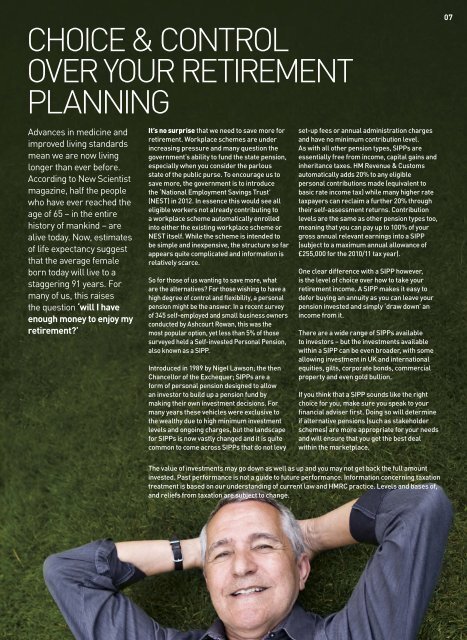Perspectives
You also want an ePaper? Increase the reach of your titles
YUMPU automatically turns print PDFs into web optimized ePapers that Google loves.
07<br />
CHOICe & COntrOl<br />
Over yOur retIrement<br />
plannInG<br />
Advances in medicine and<br />
improved living standards<br />
mean we are now living<br />
longer than ever before.<br />
According to new Scientist<br />
magazine, half the people<br />
who have ever reached the<br />
age of 65 – in the entire<br />
history of mankind – are<br />
alive today. now, estimates<br />
of life expectancy suggest<br />
that the average female<br />
born today will live to a<br />
staggering 91 years. For<br />
many of us, this raises<br />
the question ‘will I have<br />
enough money to enjoy my<br />
retirement?’<br />
it’s no surprise that we need to save more for<br />
retirement. Workplace schemes are under<br />
increasing pressure and many question the<br />
government’s ability to fund the state pension,<br />
especially when you consider the parlous<br />
state of the public purse. To encourage us to<br />
save more, the government is to introduce<br />
the ‘National Employment Savings Trust’<br />
(NEST) in 2012. In essence this would see all<br />
eligible workers not already contributing to<br />
a workplace scheme automatically enrolled<br />
into either the existing workplace scheme or<br />
NEST itself. While the scheme is intended to<br />
be simple and inexpensive, the structure so far<br />
appears quite complicated and information is<br />
relatively scarce.<br />
So for those of us wanting to save more, what<br />
are the alternatives? For those wishing to have a<br />
high degree of control and flexibility, a personal<br />
pension might be the answer. In a recent survey<br />
of 345 self-employed and small business owners<br />
conducted by Ashcourt Rowan, this was the<br />
most popular option, yet less than 5% of those<br />
surveyed held a Self-invested Personal Pension,<br />
also known as a SIPP.<br />
Introduced in 1989 by Nigel Lawson; the then<br />
Chancellor of the Exchequer; SIPPs are a<br />
form of personal pension designed to allow<br />
an investor to build up a pension fund by<br />
making their own investment decisions. For<br />
many years these vehicles were exclusive to<br />
the wealthy due to high minimum investment<br />
levels and ongoing charges, but the landscape<br />
for SIPPs is now vastly changed and it is quite<br />
common to come across SIPPs that do not levy<br />
set-up fees or annual administration charges<br />
and have no minimum contribution level.<br />
As with all other pension types, SIPPs are<br />
essentially free from income, capital gains and<br />
inheritance taxes. HM Revenue & Customs<br />
automatically adds 20% to any eligible<br />
personal contributions made (equivalent to<br />
basic rate income tax) while many higher rate<br />
taxpayers can reclaim a further 20% through<br />
their self-assessment returns. Contribution<br />
levels are the same as other pension types too,<br />
meaning that you can pay up to 100% of your<br />
gross annual relevant earnings into a SIPP<br />
(subject to a maximum annual allowance of<br />
£255,000 for the 2010/11 tax year).<br />
One clear difference with a SIPP however,<br />
is the level of choice over how to take your<br />
retirement income. A SIPP makes it easy to<br />
defer buying an annuity as you can leave your<br />
pension invested and simply ‘draw down’ an<br />
income from it.<br />
There are a wide range of SIPPs available<br />
to investors – but the investments available<br />
within a SIPP can be even broader, with some<br />
allowing investment in UK and international<br />
equities, gilts, corporate bonds, commercial<br />
property and even gold bullion.<br />
If you think that a SIPP sounds like the right<br />
choice for you, make sure you speak to your<br />
financial adviser first. Doing so will determine<br />
if alternative pensions (such as stakeholder<br />
schemes) are more appropriate for your needs<br />
and will ensure that you get the best deal<br />
within the marketplace.<br />
The value of investments may go down as well as up and you may not get back the full amount<br />
invested. Past performance is not a guide to future performance. Information concerning taxation<br />
treatment is based on our understanding of current law and HMRC practice. Levels and bases of,<br />
and reliefs from taxation are subject to change.


